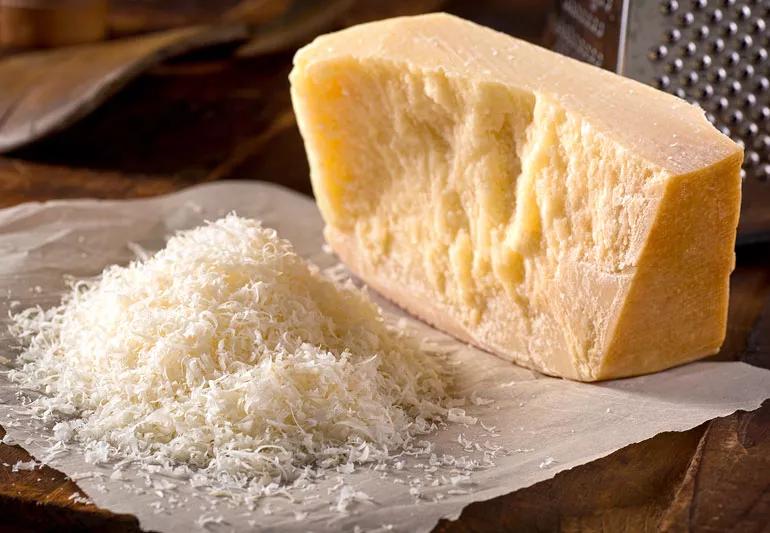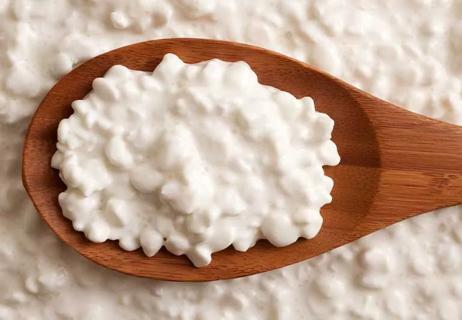This Italian delicacy packs a surprisingly nutritious punch

When you think of Parmesan cheese, what first comes to mind? For many people, it’s the powdered or grated kind you pour over pasta or sprinkle on pizza.
Advertisement
Cleveland Clinic is a non-profit academic medical center. Advertising on our site helps support our mission. We do not endorse non-Cleveland Clinic products or services. Policy
While this condiment certainly adds flavor, there’s another Parmesan cheese that’s an even better choice: Parmigiano-Reggiano, “the real-deal cheese that comes in a wheel from northern Italy,” says dietitian Alexis Supan, RD.
As it turns out, not only is Parmigiano-Reggiano delicious, but it’s nutritious and offers multiple health benefits.
Parmigiano-Reggiano is a hard cheese with just three ingredients: cow’s milk, salt and rennet. The latter is “a mix of different enzymes that we use to make cheeses,” Supan says.
Because it has so few ingredients, it’s a much denser, drier cheese. “Parmigiano-Reggiano is tightly packed,” Supan notes. “If you’re comparing that to a cheddar, or to a mozzarella, there’s not nearly as much water content. It does get a lot drier, which is why it crumbles and falls apart.”
Parmigiano-Reggiano also doesn’t have many health-related risks. “Unless you have a very specific casein intolerance or allergies, you’ve got nothing to worry about there,” Supan says. “If you do have those, you want to stay away.”
A 1-ounce (28 gram) serving of Parmigiano-Reggiano contains:
Advertisement
Unlike other kinds of cheeses, which could be high in unhealthy saturated fat and sodium and not offer much in the way of nutrients, Parmigiano-Reggiano boasts multiple health benefits.
Supan says Parmigiano-Reggiano has 10 grams of protein in a one-ounce serving. “To give you a visual of that, one ounce would be somewhere between a quarter cup and a third of a cup if we were to shred it up. Ten grams of protein for that much cheese is really incredible.”
Parmigiano-Reggiano is also a great source of calcium. Using the same serving size as above, you’ll get “at least a quarter of your daily value of calcium,” Supan says. That’s important for sustained bone health, especially as you get older. “When you’re younger, you’re more inclined to drink milk and have more cheese and other things that give you a lot of calcium in your diet,” she adds. “As you get older, you tend to not get nearly as much calcium as you need.”
Supan adds that Parmigiano-Reggiano’s calcium and the protein are high-quality because they have “very high bioavailabilities,” meaning your body can use these elements efficiently.
“Your body can absorb most of that calcium, and break down most of that protein really easily, which is fantastic,” Supan says. “Some things that you eat might have certain ingredients and nutrients you need, but your body struggles to break them down in the way you need them.”
If you find yourself with unpleasant digestive issues after eating foods with lactose, you’re not alone. “That’s something I hear all the time from people as they’ve gotten older — their ability to tolerate milk or ice cream goes way down,” Supan says. Parmigiano-Reggiano “saves the day,” however: “The way it’s put together leaves us with a cheese that has very, very little lactose in it. And it’s actually so low that we consider it a lactose-free product.”
A one-ounce serving of Parmigiano-Reggiano has roughly 8 grams of total fat and zero carbohydrates. “People often throw caution signs around anything dairy, like butter and any type of cheese, and say, ‘Oh, that’s too risky, the fat in there’s really bad,’” Supan says. “But there’s a lot of medium-chain fatty acids in Parmigiano-Reggiano. As we study them more, they’ve been shown to have some health benefits.” These fats, which are found in things such as coconut oil, can potentially lower cholesterol and blood sugar.
Parmigiano-Reggiano contains lactobacillus bacteria, which is a good bacteria “that keeps your guts happy,” Supan says. “The more we learn about our gut health, and keeping our stomachs and guts healthy, we’re finding it has a huge impact on our overall health.” For example, this could translate to a stronger immune system. “We’re starting to see relations between probiotics and gut health with everything,” she adds.
Advertisement
Parmigiano-Reggiano is highly regulated, meaning it’s made only in certain Italian provinces or within specific areas of Italian provinces, including:
In these areas, the grass eaten by cows boasts specific types of good bacteria. “That good bacteria stays in their system and is therefore in the milk used to make this cheese,” Supan says.“And because those cows are all grass-fed, they end up producing higher-quality milk, which gives us a lot more nutrients, a lot more benefits.”
In contrast, the cow’s milk used for more mass-marketed cheeses isn’t as nutritious. “A lot of those cows are fed on grain or other things so they can produce a lot more milk,” Supan says. “It’s focused more on production and quantity rather than quality.”
The active process of putting Parmigiano-Reggiano cheese together takes a few weeks, although the aging process takes far longer. “At minimum, they are going to age the cheese for one year in the different aging rooms,” Supan says. “But it can be up to several years, depending on what type of cheese you want.”
The grated Parmesan cheese found in bottles or shakers is different than Parmigiano-Reggiano, although this kind is regulated in the U.S. “It has to be a cow’s milk cheese, aged for at least 10 months,” Supan says.
Advertisement
Given the lower price and mass-produced nature of this cheese, chances are good the milk isn’t coming from grass-fed cows, she adds, meaning it’s already not going to be as nutritious. However, to prevent clumping, this grated cheese also contains additional ingredients and fillers.
This is where things can get scary, Supan says. “The extra ingredients are harmless if they’re kept in the amounts that they should be. But when companies have done quality-control testing, the actual amount added to the cheese is sometimes nowhere near where it’s reported to be.” For example, experts have found wildly varying levels of cellulose in cheaper brands — up to 10%, when the actual amount listed is 4% or less.
“That leaves you questioning, ‘How much cheese am I truly buying?’” Supan says. “If you’re not getting things in the correct amounts, then that nutrition facts label is also going to be off. You’re not getting as much protein or calcium as it says. You’re also creating a health risk by adding in so many fillers — and you’re already starting with a somewhat inferior product in the first place with that cheese.”
And so if you’re worried about exactly what you’re consuming, choosing Parmigiano-Reggiano instead is the way to go. “Parmigiano-Reggiano is a very safe cheese,” Supan says. “It’s actually probably a little bit safer than most people even realize. It really can be a great cheese for everyone.”
Advertisement
Learn more about our editorial process.
Advertisement

Health officials say that consuming unpasteurized milk increases potential exposure to harmful bacteria

There’s definite nutritional value in chocolate milk, but the added sugar and calories can be a concern

Medications, dietary changes, abdominal massage and physical activity can all help you start to feel better

Experiment with numerous dairy alternatives or try taking a lactase enzyme medication before you eat dairy

Lactose is difficult to breakdown and digest because of its complexity

Be sure to check the labels of common foods like canned tuna, bread, hot dogs and chocolate

This dairy product can help you lose weight, manage blood sugar and strengthen bones

Rich in calcium and protein, milk has 18 of 22 essential nutrients that your body needs

Wearing a scarf, adjusting your outdoor activities and following your asthma treatment plan can help limit breathing problems

Your diet in the weeks, days and hours ahead of your race can power you to the finish line

When someone guilt trips you, they’re using emotionally manipulative behavior to try to get you to act a certain way